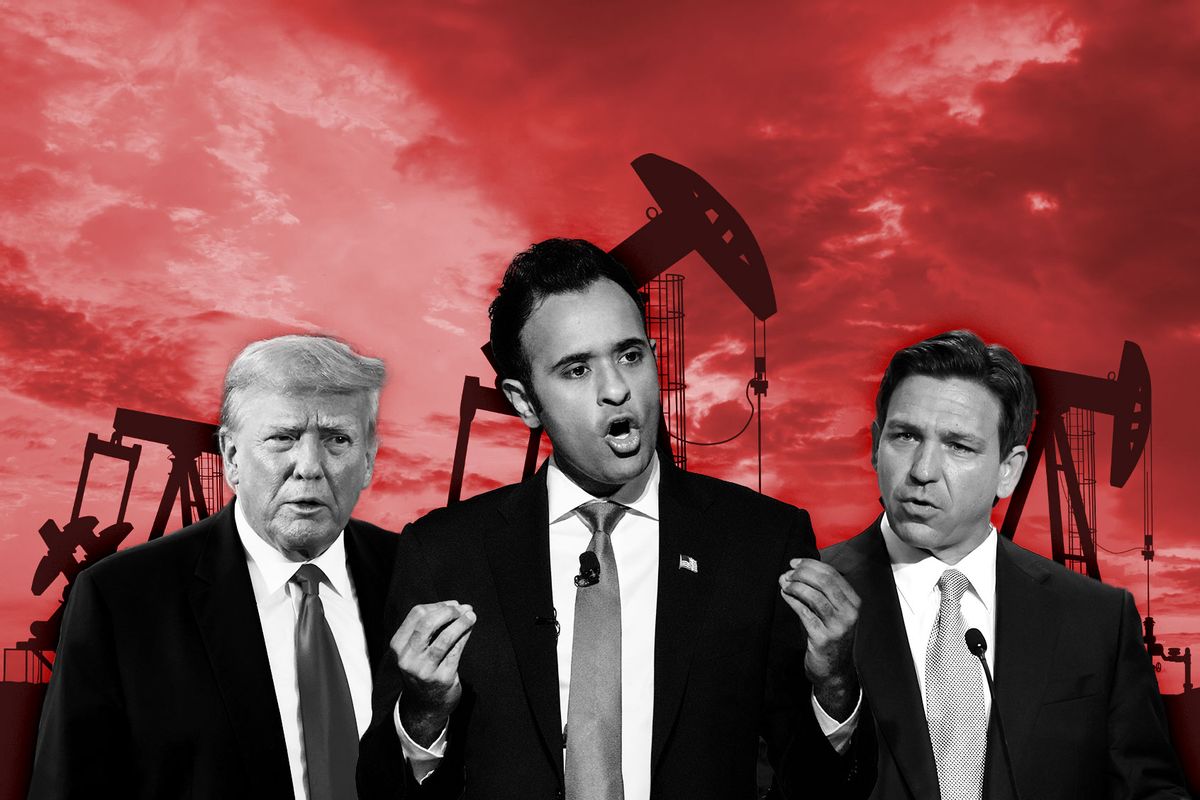Anyone who watched the first Republican presidential debate last week watched the candidates — minus Donald Trump, of course —punt on climate. Ron DeSantis, who angrily deflected the issue, has called climate change "left-wing stuff," while Vivek Ramaswamy exuberantly declared that "climate change is a hoax." Nikki Haley, whose debate performance was otherwise borderline-reasonable, thinks the U.S. should wait for China and India to reduce their carbon output first.
In fact, it was surprising that Fox News moderators asked a question about climate at all, given that over the last couple of decades Republicans, with few exceptions, have consistently denied climate science and worked to increase reliance on fossil fuels. In a sense, this was predictable: Politicians who are financed by coal, oil and gas donors will fight to protect those industries as long as corporations are allowed to fund their campaigns under Citizens United. It's a nihilistic and dangerous symbiosis that in all likelihood will only be neutralized by an increasing number of voters under 35 making their voices heard.
Project 2025: The GOP's promise to end clean energy
Two weeks before the debate, as wildfires incinerated Lahaina on the island of Maui and parts of the American South baked in uninhabitable heat, conservatives quietly unveiled their plan to kill off climate progress for good. Taking aim at Joe Biden's 2022 Inflation Reduction Act, Project 2025 proposes to erase clean energy programs from the federal government entirely while boosting the production of fossil fuels.
Republicans are still chafed over Biden's trademark legislation of last year, which is by far the most significant climate act passed in U.S. history, and is meant to incentivize and hasten the transition to a clean energy economy. The IRA only took effect in January, and it will take at least a year before its economic benefits are felt in any significant way. Anxious to prevent that from happening, conservatives have promulgated Project 2025, which proposes shredding any and all regulations designed to curb greenhouse gas emissions from cars, power plants, and oil and gas wells.
Formulated by the Heritage Foundation and distributed to all Republican presidential hopefuls ahead of the first debate, the plan would dismantle virtually all federal efforts at reducing the nation's carbon footprint in a blatant effort to bolster the fossil fuel industries, which are rapidly losing market share to greener, cleaner alternatives that in many cases are already more cost-effective, or soon will be.
No candidate in last week's debate discussed the realities of climate destruction or how rising global temperatures are fueling the migrant crisis or worsening problems on the U.S.-Mexico border. Nor did anyone acknowledge that the GOP's rejection of atmospheric science is really about campaign finance. That the Heritage Foundation, and Project 2025, are financed by the Charles G. Koch Charitable Foundation and Koch Industries, among the deepest fossil fuel pockets in the world, also went unmentioned.
But the courts step in
As oil and coal continue to generate formidable wealth for fossil fuel titans, the costs of extreme weather events are falling on people who can little afford them, and who had little to do with causing them. In the absence of legislative action, climate victims, including cities and states facing financially ruinous floods and fires, are turning to the courts.
We need your help to stay independent
Climate plaintiffs have begun a wave of climate litigation targeting fossil fuel interests, including BP, Shell, ConocoPhillips and API, ExxonMobil and Chevron. At least 20 cities and states, including Baltimore, Honolulu and Oakland, California, are suing Big Oil, armed with evidence that these corporations have known about the causal link between carbon emissions and rising temperatures all along.
Asserting claims under a variety of laws, including liability, consumer protection, trade practices, failure to warn and nuisance legislation, these plaintiffs aim to establish that fossil fuel companies knew about climate change, understood the causal link between their product and the environmental damage it can produce, and deliberately concealed those harms from the government as well as the public. They are producing evidence that fossil fuel companies have long disputed climate science in an effort to discredit it and thereby protect their profits, just as essentially the entire Republican Party is doing now.
A surprising assist from SCOTUS
In almost every case filed in state court, Big Oil defendants have sought to remove climate-related litigation from state court to federal court, in an effort to get such cases dismissed under varying procedural and legal doctrines. To date, every court that has issued a decision on removal has ruled against the fossil fuel defendants and determined that these cases do, indeed, belong in state court.
Want a daily wrap-up of all the news and commentary Salon has to offer? Subscribe to our morning newsletter, Crash Course.
This April, in fact, climate claims received an unexpected assist from the U.S. Supreme Court when the justices declined a request by oil companies to transfer a series of state lawsuits to federal court. After severely limiting the EPA's federal climate efforts last year in West Virginia v. EPA, this year's decision to allow climate claims to remain in state court came as a welcome surprise. As a result, climate cases brought by city and state governments against fossil fuel interests are not precluded by federal law, opening the door to a wide range of potential suits under state statutory and common law.
Essentially, these cases can now go forward in state court as other consumer fraud and deceptive practices lawsuits do. Climate plaintiffs seek to impose liability based on the major oil companies' deceptive marketing, including their historic disinformation campaigns and their failure to warn consumers about the dangers of climate damage, which those companies have understood for decades was coming.
None of these pending cases has yet proceeded to trial, but their impact on the energy future could be enormous.
Read more
from Salon on the climate crisis



Shares